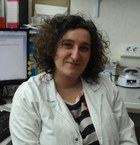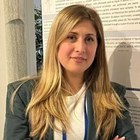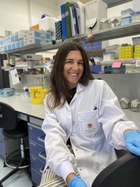People

Prof. Manuela Ferracin
Full Professor of Pathology
Full Professor of Pathology, she conducts her research in the field of oncology. Her studies focus on alterations in the expression of microRNAs and non-coding RNAs in human cancers for diagnostic and prognostic purposes, as well as on the development and characterization of tumor models derived from rare cancers.

Giulia Gallerani
Junior assistant professor (fixed-term)
I have more than 10 years of experience in the field of circulating tumor cell research (CTC). I deal with studies regarding CTCs as liquid biopsy biomarkers and as an in-vitro model of the metastatic cascade. I am certified personnel for clinical grande CTC counting using CellSearch platform and DEPArray single-cell platform.

Roberta Roncarati
Researcher CNR- IRGB
My background is molecular and cellular biologist. I had extensive training in molecular, cellular biology and genetics, working at many institutions in the United States such as Thomas Jefferson University and Albert Einstein College of medicine, Aventis Pharmaceutical Bridgewater Platform. Since 2006 I’ve joying the Italian National Research Council (CNR) as post doc and subsequently in 2009 I got a tenured position as a researcher.
Since 2011 I directed my interest in next generation approaches. I was leading a team of young investigators with a background in cardiovascular molecular biology, statistics, and genetics. I have published several manuscripts on Alzheimer disease and cardiovascular diseases in important high tier journals such as Circulation, PNAS, JBC. Since 2006 I focused my interest in genetics of monogenic disease and complex diseases in cardiovascular field.
Over the last 10 years I focused my studies on the latest advanced sequence technologies in the pre-clinical setting to study the genetics of cancer and cardiovascular disease at molecular level.
The main objective of our studies focuses on the use the Liquid biopsy as a minimally invasive technology to detect actionable biomarkers and to monitor the target therapy response and the minimal residual disease.
Circulating nucleic acids (cfNAs), including free DNA and RNA found in blood circulation and other biological fluids, as well as circulating tumor cells, exosome, and macrovesicles are part of our interest for their diagnostic, predictive, and prognostic potential, and for their valuable information about tumor characteristics and evolution.

Ilaria Pace
PhD; technician
My research centers on medical oncology and the analysis of big data generated through Next Generation Sequencing (NGS) techniques. With my expertise as a bioinformatician, I possess the skills to explore diverse analytical methods across various data types. Within the lab, I have conducted several analyses of NGS data, including the genetic characterization of cancers of unknown primary (CUP) using a liquid biopsy approach and miRNA analysis. However, my primary focus lies in leveraging Artificial Intelligence methods for computer vision and image analysis.
Currently, I am dedicated to investigating a highly aggressive and metastatic cancer with an unidentified primary site, posing challenges in pinpointing the tumor's origin. To address this, my objective is to analyze haematoxylin-eosin slides from patients and identify features that can accurately predict the primary site of the tumor.
The core goal of my research is to develop a straightforward classifier capable of determining the organ to which a tissue sample belongs. This classifier will then be applied to CUP samples, aiding medical professionals in predicting the primary site accurately. Ultimately, this advancement will greatly assist in identifying the most effective targeted therapies for patients, bringing us closer to personalized and precise treatment strategies.

Beatrice Fontana
PhD Student
I am currently a PhD candidate in Oncology, Hematology, and Pathology at the University of Bologna, where my research is centered on uncovering the mysteries behind cancers of unknown primary origin. I tackle this challenge with the same meticulousness as Sherlock Holmes, applied to the realm of cancer research. I am also driven by a strong passion for solving complex scientific puzzles. Therefore, I would love to dive into the pancreatic cancer research, aiming to pinpoint new biomarkers crucial for diagnosing and predicting outcomes.
Professionally, I have refined my skills in advanced molecular biology techniques, specifically on Next-Generation Sequencing (NGS). I also enjoy working with cells, evaluating new drugs and therapies, studying extracellular vesicles to understand the cancer microenvironment, and performing extractions of nucleic acids and proteins. The use of the droplet digital PCR (ddPCR) in our laboratory allows us to meticulously quantify nucleic acids, a critical step in precise molecular profiling and the validation of novel biomarkers.
During my internship abroad at MD Anderson Cancer Center, I worked extensively with patient-derived xenograft (PDX) models, before and after drug treatments: the in vivo models deepened my understanding of cancer biology and therapeutic development in practical settings.
Beyond my research, international travel has expanded my understanding of global healthcare challenges and innovations. I find solace in yoga, meditation, and outdoor activities… it is a fantastic way to balance the craziness of the world of cancer research!

Alessia Soru
PhD student
I was born and raised in Italy, where I earned my bachelor's degree in Industrial Biotechnology and my master's degree in Medical Biotechnology. During my master's internship, I joined Manuela Ferracin's Lab, working on a project focused on elucidating miRNA expression patterns in melanomas to establish their prognostic significance. This project also involved investigating changes in circulating miRNA levels in melanoma patients to identify potential associations with disease recurrence.
Currently, I am a graduate research assistant studying potential therapeutic targets and new oncogenic pathways in Cancers of Unknown Primary (CUP), highly aggressive tumors that are difficult to treat with existing pharmaceutical therapies. My research aims to identify primary site predictions through expression patterns, which could be crucial for determining patient treatment plans. Additionally, I seek to find common, drug-targetable patterns that could significantly impact the quality and duration of life for affected patients. My work is dedicated to advancing the understanding and treatment of these challenging cancers, offering hope for more effective therapeutic strategies.